2016听写题目
最新2016汉字听写大会模拟题库-整理版
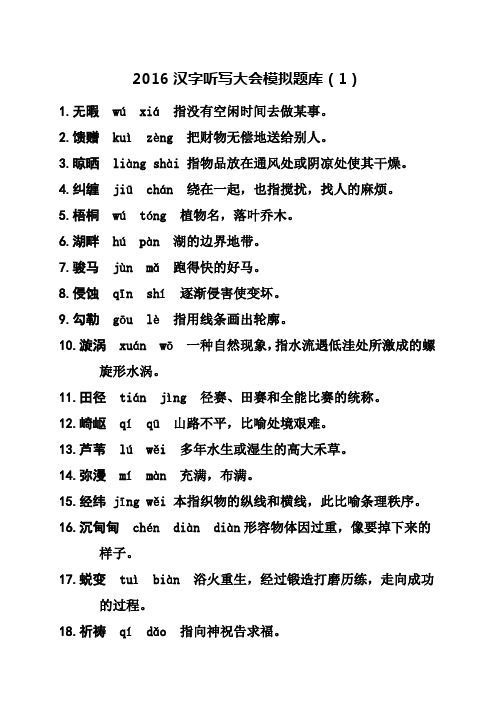
2016汉字听写大会模拟题库(1)1.无暇wúxiá指没有空闲时间去做某事。
2.馈赠kuìzèng把财物无偿地送给别人。
3.晾晒liàng shài指物品放在通风处或阴凉处使其干燥。
4.纠缠jiūchán绕在一起,也指搅扰,找人的麻烦。
5.梧桐wútóng植物名,落叶乔木。
6.湖畔húpàn湖的边界地带。
7.骏马jùn mǎ跑得快的好马。
8.侵蚀qīn shí逐渐侵害使变坏。
9.勾勒gōu lè指用线条画出轮廓。
10.漩涡xuán wō一种自然现象,指水流遇低洼处所激成的螺旋形水涡。
11.田径tián jìng径赛、田赛和全能比赛的统称。
12.崎岖qíqū山路不平,比喻处境艰难。
13.芦苇lúwěi多年水生或湿生的高大禾草。
14.弥漫mímàn充满,布满。
15.经纬jīng wěi本指织物的纵线和横线,此比喻条理秩序。
16.沉甸甸chén diàn diàn形容物体因过重,像要掉下来的样子。
17.蜕变tuìbiàn浴火重生,经过锻造打磨历练,走向成功的过程。
18.祈祷qídǎo指向神祝告求福。
19.哺育bǔyù供给食品,通过教育培养。
20.岳阳楼yuèyáng lóu湖南省岳阳市西门城楼。
21.侍奉shìfèng侍候奉养。
22.雪茄xuějiā用烟叶卷成的烟,形状较一般的香烟粗而长。
23.推荐tuījiàn介绍,建议,推举。
24.伪装wěi zhuāng假装,不真实。
25.炼油liàn yóu是将原油或其他油脂进行蒸馏的一种工艺。
26.乞求qǐqiú指请求给予。
2016汉字听写1-9年级古诗词
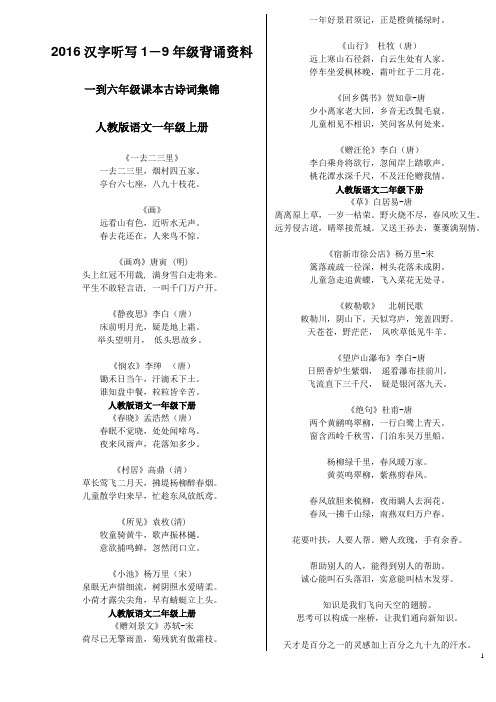
2016汉字听写1-9年级背诵资料一到六年级课本古诗词集锦人教版语文一年级上册《一去二三里》一去二三里,烟村四五家。
亭台六七座,八九十枝花。
《画》远看山有色,近听水无声。
春去花还在,人来鸟不惊。
《画鸡》唐寅 (明)头上红冠不用裁, 满身雪白走将来。
平生不敢轻言语, 一叫千门万户开。
《静夜思》李白(唐)床前明月光,疑是地上霜。
举头望明月,低头思故乡。
《悯农》李绅(唐)锄禾日当午,汗滴禾下土。
谁知盘中餐,粒粒皆辛苦。
人教版语文一年级下册《春晓》孟浩然(唐)春眠不觉晓,处处闻啼鸟。
夜来风雨声,花落知多少。
《村居》高鼎(清)草长莺飞二月天,拂堤杨柳醉春烟。
儿童散学归来早,忙趁东风放纸鸢。
《所见》袁枚(清)牧童骑黄牛,歌声振林樾。
意欲捕鸣蝉,忽然闭口立。
《小池》杨万里(宋)泉眼无声惜细流,树阴照水爱晴柔。
小荷才露尖尖角,早有蜻蜓立上头。
人教版语文二年级上册《赠刘景文》苏轼-宋一年好景君须记,正是橙黄橘绿时。
《山行》杜牧(唐)远上寒山石径斜,白云生处有人家。
停车坐爱枫林晚,霜叶红于二月花。
《回乡偶书》贺知章-唐少小离家老大回,乡音无改鬓毛衰。
儿童相见不相识,笑问客从何处来。
《赠汪伦》李白(唐)李白乘舟将欲行,忽闻岸上踏歌声。
桃花潭水深千尺,不及汪伦赠我情。
人教版语文二年级下册《草》白居易-唐离离原上草,一岁一枯荣。
野火烧不尽,春风吹又生。
远芳侵古道,晴翠接荒城。
又送王孙去,萋萋满别情。
《宿新市徐公店》杨万里-宋篱落疏疏一径深,树头花落未成阴。
儿童急走追黄蝶,飞入菜花无处寻。
《敕勒歌》北朝民歌敕勒川,阴山下。
天似穹庐,笼盖四野。
天苍苍,野茫茫,风吹草低见牛羊。
《望庐山瀑布》李白-唐日照香炉生紫烟,遥看瀑布挂前川。
飞流直下三千尺,疑是银河落九天。
《绝句》杜甫-唐两个黄鹂鸣翠柳,一行白鹭上青天。
窗含西岭千秋雪,门泊东吴万里船。
杨柳绿千里,春风暖万家。
黄英鸣翠柳,紫燕剪春风。
春风放胆来梳柳,夜雨瞒人去润花。
春风一拂千山绿,南燕双归万户春。
2016年全国卷1听力录音原文
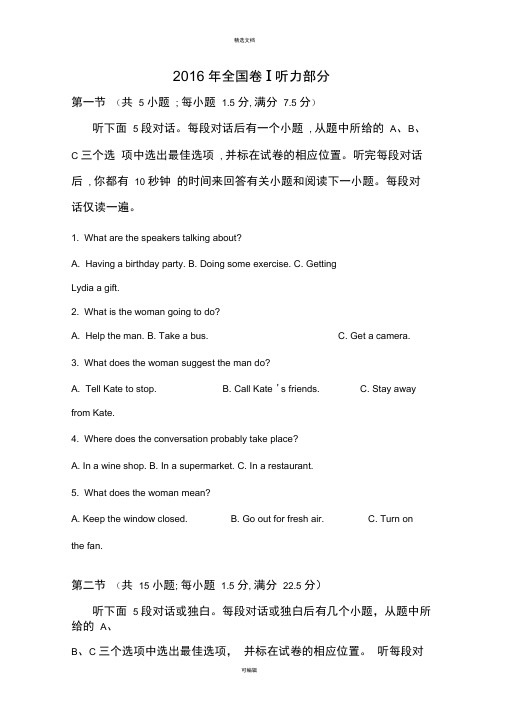
2016年全国卷I听力部分第一节(共 5 小题; 每小题 1.5 分, 满分7.5 分)听下面 5 段对话。
每段对话后有一个小题, 从题中所给的A、B、C 三个选项中选出最佳选项, 并标在试卷的相应位置。
听完每段对话后, 你都有10 秒钟的时间来回答有关小题和阅读下一小题。
每段对话仅读一遍。
1. What are the speakers talking about?A. Having a birthday party.B. Doing some exercise.C. GettingLydia a gift.2. What is the woman going to do?A. Help the man.B. Take a bus.C. Get a camera.3. What does the woman suggest the man do?A. Tell Kate to stop.B. Call Kate 's friends.C. Stay away from Kate.4. Where does the conversation probably take place?A. In a wine shop.B. In a supermarket.C. In a restaurant.5. What does the woman mean?A. Keep the window closed.B. Go out for fresh air.C. Turn on the fan.第二节(共15 小题; 每小题 1.5 分, 满分22.5 分)听下面 5 段对话或独白。
每段对话或独白后有几个小题,从题中所给的A、B、C 三个选项中选出最佳选项,并标在试卷的相应位置。
听每段对话或独白前,你将有时间阅读各个小题,每小题 5 秒钟;听完后,各小题将给出 5 秒钟的作答时间。
每段对话或独白读两遍。
2016年普通高等学校招生全国统一考试英语听力试题

2016年普通高等学校招生全国统一考试英语听力试题Section ADirections: In Section A, you will hear ten short conversations between two speakers. At the end of each conversation, a question will be asked about what was said. The conversations and the questions will be spoken only once. After you hear a conversation and the question about it, read the five possible answers on your paper, and decide which one is the best answer to the question you have heard.1. W: Can I borrow your car for a few hours this afternoon?M: I'm sorry, but I need it myself today. How about tomorrow?Q: What does the man mean?2. W: Excuse me, is this seat taken?M: No, you can sit down if you want.Q: What will the woman probably do next?3. M: Is there anything I can help you with?W: Yes, I'm looking for a book called "Introduction to Economics."Q: What does the woman want?4. M: I'm sorry, but I can't make it to the meeting this afternoon.W: That's alright. We'll just have to go on without you.Q: What does the woman mean?5. W: How was your trip to Japan?M: It was amazing! I visited Tokyo, Kyoto, and Osaka.Q: What does the man imply?6. M: Did you see the email from Mr. Johnson?W: Yes, I read it this morning. He wants us to submit the report by Friday.Q: What does the woman mean?7. M: I'm so tired. I've been studying all night for the test.W: You should've started earlier. Now you'll have to do your best with what you remember.Q: What does the woman imply?8. W: Dinner is ready! Please come to the table.M: I'll be right there. Just need to finish this last page of my essay.Q: What is the man doing?9. M: I can't believe we lost the match yesterday. Our team was so much better!W: It happens. Sometimes luck just isn't on your side.Q: What does the woman mean?10. W: The bus to the airport leaves in 5 minutes. We need to hurry!M: Don't worry, we still have plenty of time. The airport is just around the corner.Q: What does the man imply?Section BDirections: In Section B, you will hear two passages and one longer conversation. After each passage, you will be asked several questions. The passages and conversation will be spoken only once. After you hear a question, you must choose the best answer from the four choices marked A), B), C), and D). Then mark the corresponding letter on Answer Sheet 1 with a single line through the center.Passage OneQuestions 11 to 13 are based on the passage you have just heard.11. What is the speaker mainly discussing?12. When is the best time to visit Kunming?13. What does the speaker say about the temperature in Kunming?Passage TwoQuestions 14 to 16 are based on the passage you have just heard.14. Who is the speaker?15. What does the speaker say about job interviews in Japan?16. What does the speaker advise candidates to do when preparing for a job interview in Japan?ConversationQuestions 17 to 20 are based on the conversation you have just heard.17. What is the man's problem?18. Why did the woman go to the same camera shop?19. What does the woman suggest the man do?20. What will the man most likely do next?That's the end of Section A. Now you will hear Section B more time.。
2016汉字听写大赛题库及答案(小学版)
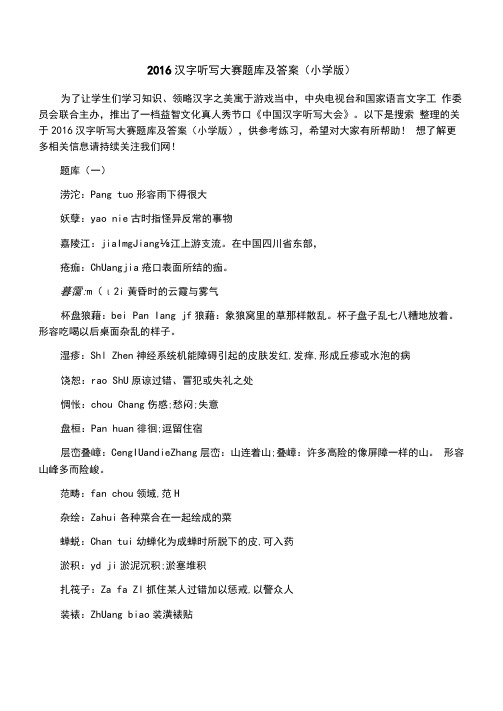
2016汉字听写大赛题库及答案(小学版)为了让学生们学习知识、领略汉字之美寓于游戏当中,中央电视台和国家语言文字工作委员会联合主办,推出了一档益智文化真人秀节口《中国汉字听写大会》。
以下是搜索整理的关于2016汉字听写大赛题库及答案(小学版),供参考练习,希望对大家有所帮助!想了解更多相关信息请持续关注我们网!题库(一)涝沱:Pang tuo形容雨下得很大妖孽:yao nie古时指怪异反常的事物嘉陵江:jiaImgJiang⅛江上游支流。
在中国四川省东部,疮痂:ChUangjia疮口表面所结的痂。
暮霭:m(ι2i黃昏时的云霞与雾气杯盘狼藉:bei Pan Iang jf狼藉:象狼窝里的草那样散乱。
杯子盘子乱七八糟地放着。
形容吃喝以后桌面杂乱的样子。
湿疹:Shl Zhen神经系统机能障碍引起的皮肤发红,发痒,形成丘疹或水泡的病饶恕:rao ShU原谅过错、冒犯或失礼之处惆怅:chou Chang伤感;愁闷;失意盘桓:Pan huan徘徊;逗留住宿层峦叠嶂:CengIUandieZhang层峦:山连着山;叠嶂:许多高险的像屏障一样的山。
形容山峰多而险峻。
范畴:fan chou领域,范H杂绘:Zahui各种菜合在一起绘成的菜蝉蜕:Chan tui幼蝉化为成蝉时所脱下的皮,可入药淤积:yd ji淤泥沉积;淤塞堆积扎筏子:Za fa Zl抓住某人过错加以惩戒,以警众人装裱:ZhUang biao装潢裱贴中流砥柱:zhδngIiU Cil ZhU就象屹立在黄河急流中的砥柱山一样。
比喻坚强独立的人能在动荡艰难的环境中起支柱作用。
翘楚:qiao ChU比喻杰出的人才或事物余烬:yujin灰烬,指被火烧剩的灰烬;被消灭物体的残余疑窦丛生:yfdou Congsheng是指有许许多多疑点产生,十分怀疑而产生不信任。
摒除:bing ChU排除杀手铜:Sha shδu jian 一作撒手铜,喻指取胜的绝招做鼠:y2nshd哺乳动物。
16年高考英语听说考试真题C录音原文与参考答案
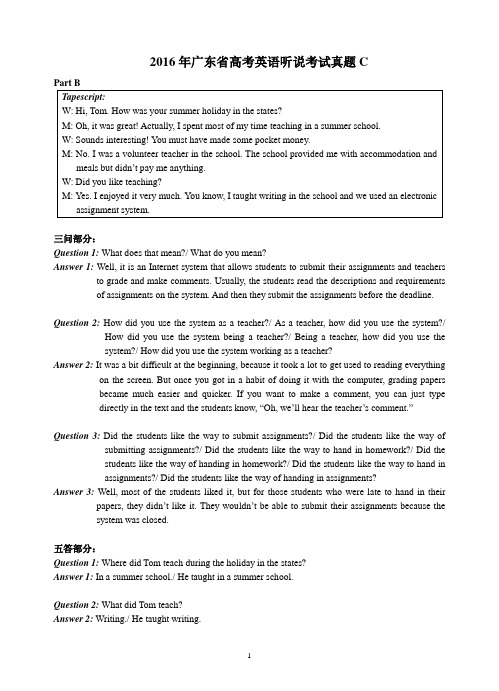
2016年广东省高考英语听说考试真题C三问部分:Question 1: What does that mean?/ What do you mean?Answer 1: Well, it is an Internet system that allows students to submit their assignments and teachers to grade and make comments. Usually, the students read the descriptions and requirementsof assignments on the system. And then they submit the assignments before the deadline.Question 2: How did you use the system as a teacher?/ As a teacher, how did you use the system?/ How did you use the system being a teacher?/ Being a teacher, how did you use thesystem?/ How did you use the system working as a teacher?Answer 2: It was a bit difficult at the beginning, because it took a lot to get used to reading everything on the screen. But once you got in a habit of doing it with the computer, grading papersbecame much easier and quicker. If you want to make a comment, you can just typedirectly in the text and the students know, “Oh, we’ll hear the teacher’s comment.”Question 3: Did the students like the way to submit assignments?/ Did the students like the way of submitting assignments?/ Did the students like the way to hand in homework?/ Did thestudents like the way of handing in homework?/ Did the students like the way to hand inassignments?/ Did the students like the way of handing in assignments?Answer 3: Well, most of the students liked it, but for those students who were late to hand in their papers, they didn’t like it. They wouldn’t be able to submit their assignments because thesystem was closed.五答部分:Question 1: Where did Tom teach during the holiday in the states?Answer 1: In a summer school./ He taught in a summer school.Question 2: What did Tom teach?Answer 2: Writing./ He taught writing.Question 3: What would the students find out about their assignments on the system?Answer 3: The descriptions and requirements of assignments.Question 4: How do teachers make a comment on the system?Answer 4: Type directly in the text./ They type directly in the text.Question 5: Why couldn’t the students submit assignments late?Answer 5: Because the system was closed.参考复述:Mary loved dolls very much, but she didn’t have one. She asked her mom to buy her one many times, but she was refused, because her mom had to support the family. Before Mary’s birthday, Mary tried to talk to her mom again that her friends all have their own dolls. Her mom said nothing, which made Mary very upset. At night, Mary put her hand into her mom’s purse, took out some money and hided them. The next morning, Mary was excited, because she would buy herself a doll. But at breakfast, she saw a beautiful doll on the table. Her mom said to her happy birthday and told her she made the doll for her. After knowing what her mom did for her, Mary felt very ashamed. She told her mom the truth and promised she would not do that again.。
2016年一年级语文上册拼音生字听写表(新版语文S版带拼音版)

2016年一年级语文上册拼音生字听写表(新版语文S版带拼音版)??澹?姣?琛?b p m f d t n l g k h j q x zh ch sh r z c s y w 闊?姣?琛?鍗曢煹姣?锟斤拷o e i u眉澶嶉煹姣?锟斤拷i ei ui 锟斤拷o ou iu ie 眉e 鐗规畩闊垫瘝er 鍓嶉蓟闊垫瘝锟斤拷n en in un 眉n 鍚庨蓟闊垫瘝锟斤拷n锟斤拷en锟斤拷in锟斤拷on锟斤拷zhi chi shi ri zi ci si yi wu yu ye yue yu锟斤拷n yin yun yin锟斤拷浜屻€佹嫾闊充腑瀹规槗鍑洪敊鐨勫唴瀹?1銆佸綋j q x y 涓?眉鎴?眉e : 鈥渏q x y 鈥濈湡娣樻皵锛屼粠涓嶅拰u眉鍋氭父鎴忥紝瑙佷簡灏?眉鑴卞附鍙堟暚绀笺€?濡傦細q鈥?眉e )鈫抭ue j鈥暶?鈫? ju ) (x)鈥?眉)鈫抶u y鈥暶糴鈫?(yue) l鈥?眉)鈫?l菤(n)鈥?菤鈫抧菤j鈥暶尖€曪拷锟絥鈫?(ju锟斤拷n ) ?u)鈥曪拷锟絥鈫掞拷锟絬锟斤拷n (q)鈥?眉)鈥曪拷锟絥鈫?qu锟斤拷n ) x鈥?眉)鈥?锟斤拷n)鈫抶u锟斤拷n?璇嗗瓧涓€锛?1.瑙傚療浜轰綋璇嗘眽瀛?浜簉茅n锛堜汉鍙?浜烘墠浜哄搧澶т汉锛?菕u锛堝彛鎵?浜哄彛鍙eご闂ㄥ彛锛?鍏玝膩锛堜竷涓婂叓涓?摜m霉锛堣€崇洰?2. 鐢昏瘑瀛楃湡鏈夎叮涓妔h脿n锟芥簝銊夎埛锟?涓婇潰涓婂崍涓婃柟锛夐┈m菐锛堥┈涓?鏈ㄩ┈锛??鏃ュ瓙鏃ュ嚭绾㈡棩锛?鏈坹u猫锛堟湀鐗?鏈堜寒鏈堝厜鏄庢湀锛?3. 鎴戝湪瀹堕噷璐村瓧鍗?鍒€d膩o锛堝皬鍒€鍒€瀛?鍒€鐗?姘存灉鍒€锛?灏弜i菐o锛堝ぇ灏?灏忛笩灏忛┈灏忛洦锛?灞眘h膩n锛?灞变笂澶у北灞卞窛锛??鑺?鏈?鐏玥u 菕(澶х伀鐢熺伀?鎴憌菕锛堟垜浠???鍏鍦焧菙(鍦熷湴鍦熼噷鍦熸湪鍦熸皵锛?浜憏煤n锛堢櫧浜?浜戞湹涔屼簯椋庝簯锛?(澶т汉澶ч棬澶ч澶ч洦锛?绂緃茅(绂捐嫍)??涔爔铆锛堣嚜涔?瀛︿範缁冧範涔犲瓧锛?鏈墆菕u锛堟病鏈?鏈夌殑鏈夋棤锛?涔恖菐锛堝揩涔?闊充箰yu菐涔恲u菐鏇诧級鍚宼贸n锟芥簝煤鐓岋拷鍚屾牱鍏卞悓锛??闆ㄥ悗鐨勬.鏋?鏈╩霉(鏈ㄥご鏈ㄩ┈鏈ㄨ溅鏈ㄨ€筹級寮€k膩i (寮€鍙?寮€闂?寮€蹇?寮€杞︼級姘磗hu菒锛堟按鏋?寮€姘?闆ㄦ按姘村钩锛夎€衬況锛堣€虫湹鏈ㄨ€?鑰崇洰鑰虫満锛??姹?鍗?鐢皌i谩n(姘寸敯鐢板湴绂剧敯鐢伴噷锛?鍖梑臎i锛堝寳鏂?鍖椾含鍗楀寳鍖楅潰锛?涓渄艒n锟芥簝菢锟借タ骞夸笢涓滄柟锛夎タx墨锛堣タ鏂?涓滆タ瑗垮寳瑗跨摐锛?楸紋煤锛堥奔澶?楸肩墖灏忛奔楸煎効锛??灏忓皬鐨勮埞鍎棵﹔(鍎垮瓙楸煎効楦熷効?i菐n锟芥簝锟戒袱涓?涓ゅぉ涓ゆ湀涓ゆ湰锛?澶﹖i膩n(澶╃敓澶╀笂澶╃┖鐧藉ぉ锛?鍙獄h菒锛堝彧鏈??鍙獄h墨锛堜竴鍙??璇?椋?涔焬臎锛堜篃璁竫菙涔熸槸涔熷ソ涔熸湁锛?椋巉膿n拷澶ч椋庤溅锛?璧皕菕u锛堣蛋寮€璧板嚭鍑鸿蛋琛寈铆n锟介浄鎾糕敯锟絲脿i锛堝湪瀹?姝e湪h谩n锟芥簝锟??鏍?鍙?闀縵h菐n锟斤拷(闀垮ぇ鐢熼暱闀垮嚭闀縞h谩n?鍏磝矛n锟芥簝菧鍜濓拷鍏磋叮q霉鍏磝矛n锟藉┆鍩斤拷铏玞h艒n锟芥簝菙濞戯拷灏忚櫕?鍏磝墨ng锛堝叴鍔?鍏村缓鐧惧簾寰呭叴褰揹脿n锟芥簝菛寮婏拷閫俿h矛褰?褰揹膩n锟芥湕淇濓拷?鐪?涔?鍙坹貌u锛堝張绾㈠張澶?鍙堟潵鍙堝幓锛?h奴锛堜功鏈?涔︾毊鐪嬩功涔﹀啓锛?鎵媠h菕u锛堟墜蹇?鎵嬮噷姘存墜鍙屾墜锛?鏈琤臎n锛堜功鏈?潵?缁胯壊鐨勯噾楸?浜唋e锛堝紑浜?璧颁簡灏戜簡鍏充簡锛?鍚巋貌u锛堝悗鏉?鏃ュ悗鍚庢柟浠ュ悗锛?浜唋i菐o锛堟槑浜?涓€?浜嗚В锛?浜攚菙锛堜簲浜?浜斾釜鍗佷簲浼歨u矛锛堝紑浼?浼氶潰澶т細锛?浼歬u脿i锛堜細璁★級?鑷宸眏菒锛堣嚜宸?鐭ュ繁鑸峴h臎宸变负w猫i浜猴級鑷獄矛锛堣嚜宸?瀛恴菒锛堝効瀛?鏃ュ瓙瀛愬コ鏋滃瓙锛?鏋滐拷锟絬菕锛堟灉瀛?姘存灉鏋滅毊鐡滄灉锛?鍘籷霉锛堟潵鍘?鍘诲勾ni谩n 鍥炲幓涓婂幓锛?杞昏交鍦?n锟芥簝眉銇诧拷宸ヤ汉宸ュ巶h猫ng?姝i棬姝f柟姝eソ锛?h膿ng鎵峜谩i锛堝彛鎵?鎵嶅瓙鏂规墠浜烘墠锛?鍥瀐u铆锛堟潵鍥?鍥炲幓鍥炲ごji膩锛?闂╩茅n锛堝嚭闂?寮€闂?澶ч棬闂ㄥ彛锛?璇嗗瓧浜岋細1銆佽竟鐪嬬數瑙嗚竟璇嗗瓧涓僸墨锛堜竷鍗?涓冧釜涓冨ぉ涓冩湀锛?绫砿菒锛堝ぇ绫?灏忕背鐧界背鐢熺背锛?h膿锛堢伀杞?鐢佃溅寮€杞︼級鍏塯u膩ng锛堝厜褰ヽ菐i 鏈堝厜?2涓瓃h艒n?姘翠腑绌轰腑锛?n锟芥簝眉锟界墰?鐢礵i脿n锛堟按鐢?鐐圭伅鐢靛伐鐢佃溅锛?3涓噖脿n锛堝崄涓?涓囦竴涓囧垎鍗冧竾锛?姘憁铆n锛堜汉姘?鍐滄皯鍏姘戜富锛?鐧綽菐i锛堢櫨涓?涓€鐧?鐧惧悎x矛n锟芥簝锟?绔箊h煤锛堢?绔瑰彾绔规灄绔圭瑡s菙n锛??i膩ng锛堜埂鏉?鑰佷埂涔¢暱涔′笅锛?澶磘贸u锛堝嚭澶?鏈ㄥご寮€澶达級鏄痵h矛锛堟槸鍚?涔熸槸鍙堟槸锛?鍗佷簩鏈堟瓕涔漥i菙锛堜節鍗?涔濅釜涔濆勾涔濇湀锛?鍥泂矛锛堝洓涓?鍥涘崄鍥涢潰鍥涙柟锛?濂硁菤锛堝コ鍎?濂冲瓙濂充汉灏戝コ锛?鍏璴i霉锛堝叚鍗??鐗沶i煤锛堢墰姣?姘寸墰鐗涘ご锛?鍗坵菙锛堜笂鍗?涓嬪崍鍗堜紤锛?鐭虫Υ绗戜簡鍔沴矛锛堢數鍔?鐢ㄥ姏鍑哄姏浜哄姏锛?鐗檡谩锛堜笂鐗?涓嬬墮闂ㄧ墮鏈堢墮锛?鐜媤谩n锟芥簝銊嶉咕锟?鐜嬪瓙鍥絞u贸鐜嬶級鐭硈h铆锛堢煶澶?鐭冲瓙鍖杊u脿鐭筹級娴?鑺?涓媥i脿锛堜笅鏉?涓婁笅澶╀笅涓嬮洦锛?璐漛猫i 锛堝疂b菐o璐?璐濆3k茅娴疯礉锛?涓峛霉锛堜笉琛?涓嶅ソ涓嶇敤锛?瑙乯i脿n锛堢湅瑙?瑙侀潰锛?姘攓矛锛堝ぉ姘?鐢熸皵姘斿懗鍙f皵锛?鍑篶h奴锛堟棩鍑?鍑哄叆鍑哄彛鍑烘潵锛?鍙搁┈鍏?鍑爅菒锛堝嚑涓?鍑犱汉鍑犲洖鍑犵墖锛?蹇儀墨n锛堝皬蹇?鐢ㄥ績鎵嬪績蹇冮噷锛??涓€涓?鍑犱釜?浠杢膩锛堜粬浜?浠栦滑浠栦埂xi膩ng锛?鍙媦菕u锛堟湅鍙?鍙嬩汉鍙嬪ソh菐o锛?鍙鍙や唬鍙よ€?鍙や粖j墨n锛?涔岄甫鍠濇按鍗噑h膿n锟芥簝銊変粰锟?鍗囨棗鍗囦笂鍗囪捣锛?閲宭菒锛堢敯閲?姘撮噷蹇冮噷鎵嬮噷锛?鍔瀊脿n锛堝紑鍔?鍔炴硶f菐鍔炲叕鍔炲伐鍘傦級澶歞u?澶氫箞澶氬勾锛?鍙痥臎锛堝彲浠?锛?皬鐧藉厰锛堜竴锛?澶猼脿i锛堝お澶?y谩n锟斤拷櫧b谩i锛堢櫧绫?鐧戒簯鐧藉ぉ鐧芥棩锛?涓癴膿ng锛堜赴鏀?涓板勾ni谩n 锛?鐨刣e锛堜綘鐨?缁縧菧鐨?鎴戠殑锛?堜簩锛?椋瀎膿i?椋炲洖椋炲叆椋為笩锛?浣爊菒锛堜綘濂?浣犱滑浣犵殑锛?楦焠i菐o锛堥笩鍎?灏忛笩椋為笩姘撮笩锛?鏃﹝菐o锛堟棭涓?鏃╃偣鏃╁畨锛?i锛堜笂鏉?涓嬫潵浠庢潵鍥炴潵锛?鑰乴菐o锛堣€佷汉鑰佸勾鍙よ€?鑰佸笀sh墨锛?。
2016年全国卷1听力录音原文【精品】

2016年全国卷Ⅰ听力部分第一节(共5小题; 每小题1.5分, 满分7.5分)听下面5段对话。
每段对话后有一个小题, 从题中所给的A、B、C三个选项中选出最佳选项, 并标在试卷的相应位置。
听完每段对话后, 你都有10秒钟的时间来回答有关小题和阅读下一小题。
每段对话仅读一遍。
1. What are the speakers talking about?A. Having a birthday party.B. Doing some exercise.C. Getting Lydia a gift.2. What is the woman going to do?A. Help the man.B. Take a bus.C. Get a camera.3. What does the woman suggest the man do?A. Tell Kate to stop.B. Call Kate’s friends.C. Stay away from Kate.4. Where does the conversation probably take place?A. In a wine shop.B. In a supermarket.C. In a restaurant.5. What does the woman mean?A. Keep the window closed.B. Go out for fresh air.C. Turn on the fan.第二节(共15小题; 每小题1.5分, 满分22.5分)听下面5段对话或独白。
每段对话或独白后有几个小题,从题中所给的A、B、C三个选项中选出最佳选项,并标在试卷的相应位置。
听每段对话或独白前,你将有时间阅读各个小题,每小题5秒钟;听完后,各小题将给出5秒钟的作答时间。
每段对话或独白读两遍。
听第6段材料,回答第6、7题。
6. What is the man going to do this summer?A. Teach a course.B. Repair his house.C. Work at a hotel.7. How will the man use the money?A. To hire a gardener.B. To buy books.C. To pay for a boat trip.听第7段材料,回答第8、9题。
- 1、下载文档前请自行甄别文档内容的完整性,平台不提供额外的编辑、内容补充、找答案等附加服务。
- 2、"仅部分预览"的文档,不可在线预览部分如存在完整性等问题,可反馈申请退款(可完整预览的文档不适用该条件!)。
- 3、如文档侵犯您的权益,请联系客服反馈,我们会尽快为您处理(人工客服工作时间:9:00-18:30)。
汉字听写题目
一、汉字听写
克扣kè非法扣减应该发给别人的财物克扣军饷1. 非法扣减应该发给别人的财物。
凹凼āo dàng 【解释】方言,凹陷的水坑,引申为陷阱,设的圈套。
归省guī xǐng【释义】从外地回到家乡探亲。
家喻户晓每家每户都明白;谓人人皆知
语无伦次形容话讲得很乱,没有条理层次
眼花缭乱形容眼睛看见复杂纷繁的东西而感到迷乱。
比喻事物复杂,无法辨清。
驻足是指停住脚步的意思
吊唁是指亲友接到讣告后来吊丧,并慰问死者家属
诘问责问,质问
深恶痛疾痛恨的程度已经到达了不能用语言来形容的地步了
鹤立鸡群像仙鹤立在鸡群之中;比喻才能或仪表出众。
正襟危坐意思是整一整衣服,端正地坐着。
形容严肃或拘谨的样子。
家醅自家酿的酒
栈桥形状像桥的建筑物,车站、港口、矿山或工厂,用于装卸货物或上下旅客或专供施工现场交通、机械布置及架空作业用的临时桥式结构。
蓬蒿一年生或二年生草本植物,叶互生,长形羽状分裂,花黄色或白色,与野菊花很像。
痴想指呆呆地想
啜泣指抽噎、抽泣,抽抽搭搭地哭。
收敛常指减轻放纵的程度,
倔强倔jué顽强,固执
点缀指衬托;装饰。
贪婪tān lán。
对财物、钱等充满非同寻常的强烈欲望背道越规的需求就是贪婪。
黛色dài sè【释义】黛色:中国传统色彩名词,青黑色。
洗濯xǐ zhuó【释义】①洗涤。
②除去罪过﹑积习﹑耻辱﹑仇恨。
【
贮蓄储存,积聚。
指储存的物品。
.
竦峙sǒng zhì高高地挺立
清洌qīng liè 意思:水质清澈而透亮。
枯涸kūhé 英文:[dried up] 解释:①干涸,没有水了。
静谧:jìng mì【解释】:[peaceful; quiet] 寂静;平静心境静谧
嫌恶xián wù【释义】:厌恶,讨厌。
嫌xián 可疑之点恶wù不好【造句】:比如说你看一个人或一群人不顺眼,
磅礴形容气势盛大,广大无边。
一般形容名山大川气势浩大,
苦心孤诣kǔ xīn gū yì①指苦心钻研,到了别人所达不到的地步。
黯然缥缈àn rán piāo miǎo 【释义】:昏暗得看不分明.缥缈,隐隐约约,若有若无。
引弦而战xián拿起弓箭去打仗。
嫉妒因人胜过自己而产生的忌恨心理相互嫉妒
确凿què záo非常确实
堕落duò luò是思想和行为向消极的方向倾斜
禀告bǐng gào词义:旧指向上级的人报告尊称为禀告。
泯灭mǐn miè【基本释义】灭绝;消失。
笑柄指被人用来取笑的把柄;嘲笑的理由。
马革裹尸用马皮把尸体包裹起来,多指军人战死于沙场。
妇孺皆知fù rú jiē zhī,意思就是妇女和小孩都知道,
慷慨淋漓kāng kǎi lín lí解释慷慨,充满正气,情绪激昂,痛快淋漓;
水门汀水门汀吴方言,水刷石地面(一种人造石料)。
玉簪花多年生草本植物
口头禅kǒu tóu chán。
原指有的禅宗和尚只空谈禅理而不实行,也指借用禅宗常用语作为谈话的点缀。
荸荠bí qi 既可作水果,又可作蔬菜
戆直zhuàng zhí意为憨厚而刚直。
谶语chèn yǔ即迷信的人指事后应验的话。
妍媸yán chī,表示美和丑,出于《文赋》。
懵懂měng dǒng头脑不清楚或不能明辨事物,
悭吝qiān lìn吝啬;小气。
京畿jīng jī国都及其附近的地区。
纵横捭阖zòng héng bǎi hé自由的横竖开合
春风骀荡chūn fēng dài dàng春风使人舒畅。
借以表达内心愉悦的情感态度。
嘉言懿行jiā yán yì xíng有教育意义的好言语和好行为。
